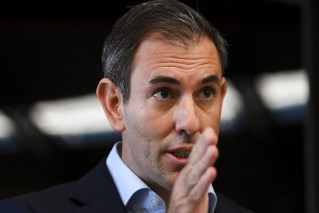The ‘confidence trick’ that might fall out of fashion if Coaldrake has his way
Changes to Queensland’s lobbying laws, put forward by the Coaldrake review, will open the curtains on at least one well-worn excuse for keeping things secret, writes Robert MacDonald.


Peter Coaldrake has delivered a stinging rebuke to Queensland's public sector integrity. '. (AAP Image/Alan Porritt)
Companies doing business with the Queensland Government will soon find it harder to hide behind the commercial-in-confidence curtain.
And consultants and contractors will have to change the way they bid for public sector work.
That’s assuming the recommendations in Professor Peter Coaldrake’s review into the culture and accountability of the Queensland public service are adopted in full – as promised by Premier Annastacia Palaszczuk.
Coaldrake makes it clear in his report he thinks the commercial-in-confidence excuse is used too often.
“The community certainly tires very quickly when politicians, of any colour and in any jurisdiction, hide behind Cabinet or ‘commercial-in-confidence’ to fend off legitimate questioning on even routine matters,” Coaldrake says.
And it’s not just politicians. It’s also the companies doing government business.
Coaldrake cites examples of companies – Adani Mining, Walt Disney and Ramsay Health Care among them – which have successfully blocked the release of information cleared by the Queensland Information Commissioner by winning appeals to the Queensland Consumer and Administrative Appeals Tribunal (QCAT).
He says recent rulings by QCAT have expanded and broadened the interpretation of “breach of confidence exemptions” under the Right to Information Act.
So much it seems, that as long as a company has inserted a breach-of-confidence clause in its contract, information that might otherwise have been released – such as how much money Queensland paid Disney to film the fifth instalment of the Pirate of the Caribbean series on the Gold Coast – can remain secret.
Coaldrake says QCAT’s interpretation of the act is now settled in law.
“However, the point to make is that agencies should not be quick to agree to confidentiality clauses which are proposed by sophisticated commercial parties to protect their own interests,” he says.
“An agency can exercise its discretion to disclose information even where that information qualifies for an exemption.”
He notes that “government procurement policies provide that confidentiality and commercial-in-confidence clauses should not ‘be used as a matter of course and only included where there is strong justification for confidentiality’.
In short, public servants need to know how and when to stand up to clever private sector lawyers and their clients.
And companies will need to accept they can’t hide their favourable deals with government behind the black letter of contract law.
“As was noted in a 2018 report of the Queensland Audit Office, ‘the public has a right to know how much public money government is spending, on what, and with which vendors”, Coaldrake says.
Coaldrake also addresses the Government’s growing use of consultants and contractors to do the work once regarded as core public service skills, such as designing and delivering services and analysing issues.
“The review found that this capacity has been progressively eroded over time,” he says.
“In part this has been contributed to by the growing influence of the ministerial offices of incoming governments fearful of relying on a public service ‘captured’ by the values and policies of a different government.
“In part, too, there sometimes has been a policy preference for advice drawn from private sector professional sources.
“In other cases, the justification for seeking external advice has stemmed from the pace of change (for example, in IT systems procurement and implementation) making it difficult, if not impossible, for the public sector to maintain an adequate level of expertise across all its primary and enabling activities.”
Coaldrake’s solution to the resultant hollowing-out of public sector capacity is for the Government to demand more from external consultants and service providers.
He recommends that “every consultancy should demonstrate how they will build capacity in the officials in the relevant project area”.
In other words, simply providing a contracted service won’t be enough.
Consultants bidding for government business will, under the new regime, also have to include details of how they plan to transfer knowledge and skills to the public sector.
More broadly, Coaldrake recommends that government agencies “more robustly account for the benefits derived from engaging consultants and contractors, with regular monitoring by the Auditor-General”.
“A complex project relying on new or emerging skills and technologies or international best practice not yet present or fully developed in government, or to bring experience of new models and thinking to a problem, are good reasons for seeking outside advice,” he writes.
“Undertaking tasks which should be core business for public servants, such as writing a business case for an initiative against comprehensive Treasury Guidelines, or to fill a short-term skills or labour gap, are not. “
That’s to say, no more easy rides for consultants offering work the government should be doing itself.
Publisher’s note: InQueensland has used the services of government relations firm Hawker Britton in dealings with the Queensland Government. This work has been fully declared on the State Government lobbyist register












